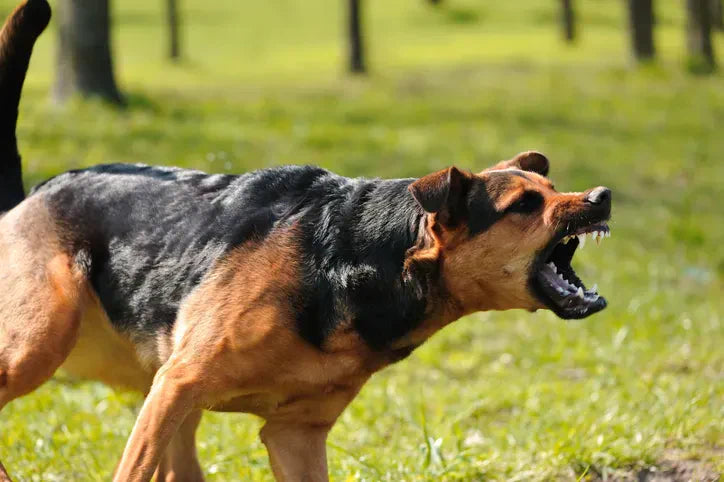
Aggressive Behavior in Dogs: Causes, Training, and Solutions
Understanding Aggressive Behavior in Dogs

Dog aggression is a pet parent’s worst nightmare. This can look like growling, biting, lunging, or snapping. Fact: Identifying what drives aggression is vital in managing it correctly and creating a safe space between the pet and the family. Let’s look at the common causes of aggression in dogs.
Common Causes of Aggression in Dogs

1. Territorial Aggression
Some dogs get aggressive when they perceive an invasion of their home or family. This is a common behaviour in naturally protective breeds.
2. Fear-Based Aggression
Dogs may show aggression when they feel threatened. Rescue dogs or those with traumatic pasts are particularly vulnerable to fear-based aggression.
3. Pain-Induced Aggression
Some dogs become aggressive when touched, due to pain from an injury or an underlying medical condition. Arthritis or dental disease can also cause this type of aggression.
4. Possessive Aggression (Resource Guarding)
Dogs become aggressive over food, toys, or their human companions. Instincts and poor training are usually to blame for their actions.
5. Social Aggression
Inadequate socialization of puppies can lead to aggression or confrontation with other pets or humans.
Real-Life Examples of Dog Aggression Cases
Case 1: The Scared Rescued Dog: Max
Max, a rescue German Shepherd, would snarl and snip at guests. A certified dog trainer spent time desensitizing him and teaching him to trust people, using positive reinforcement techniques to help him regain his confidence. After that, the aggression decreased over time.

Case 2: Bella the Resource Guarder
A Labrador Retriever named Bella was aggressive around her food bowl. Her pet parents counter-conditioned her by rewarding her when they got close to her food while she was eating, and over time, she stopped doing it.

Prevention and Training Techniques
1. Early Socialization
Get your puppy used to a range of people, pets, noises and places while he’s young—this will help reduce aggression later on.

2. Obedience Training
Basic commands such as “sit,” “stay,” and “leave it” help minimize bad behaviour and build control and trust between dog and pet parent.

3. Positive Reinforcement
Positive reinforcement is a reward-based training method. Punishment should be avoided as it can create fear-based aggression.

4. Professional Guidance
In the event of aggression, however, you should consult a certified dog behaviourist or a veterinarian, as aggression can stem from deeper issues.

Statistics and Insights from Veterinarians
-
According to the American Veterinary Society of Animal Behavior, aggression is the No. 1 reason families surrender dogs to shelters.
-
According to a paper published in the Journal of Veterinary Behavior, fear and anxiety are common triggers of aggression in dogs.
-
Using the appropriate training and supplements, many dogs can vastly improve their behavioural issues.
Supplements to Help Manage Aggression in Dogs
1) Venttura Immuno+
-
Contains colostrum to support immunity and ease anxiety
-
Aids in the relaxation of stressed dogs and promotes overall wellness
-
Learn more about Immuno+ Dog

2) Venttura Omega+
-
High in omega-3 fatty acids for brain function and reducing stress-related aggression.
-
Helps promote calm behaviour
-
Learn more about Omega+ Dog

3) Venttura Nutri+ Pro
-
A mood-balancing multivitamin that promotes well-being
-
Helps the nervous system, calming anxious or aggressive behaviour
-
Learn more about Nutri+ Pro Dog

FAQs on Dog Aggression
Are aggressive dogs trainable?
Yes! Through consistent training, socialization, and, in some cases, professional help, aggressive dogs can learn to control their behaviour.
Should I punish my dog for aggressive behaviour?
No, punishing aggression can heighten fear and exacerbate the problem. Instead, promote good behaviour using positive reinforcement methods.
When should I seek professional help for my aggressive dog?
If your dog’s aggression continues to escalate and training isn’t making a difference, or if your dog poses a threat to people or other animals, consult a veterinarian or behaviourist.
Conclusion
With the right resources, approach and above all, patience, aggressive dogs can overcome a lot of behavioural challenges. Training, positive reinforcement, and support supplements, such as Venttura Immuno+, Omega+, and Nutri+ Pro, can contribute greatly to supporting calmness. If your dog exhibits aggressive behaviour, consult a veterinarian or behaviourist for assistance.
With patience and proper care, you can ensure your dog leads a happy and well-adjusted life!
For more expert tips on dog behaviour, training hacks, and pet care, follow us on Instagram: @ventturain.
